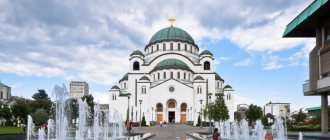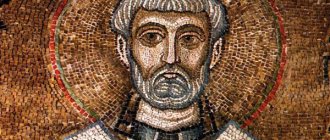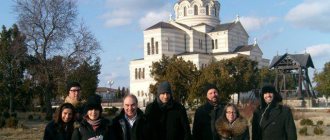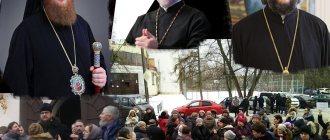| Metropolitan Clement (Kapalin) |
Clement (Kapalin)
(born 1949), Metropolitan of Kaluga and Borovsky, head of the Kaluga Metropolis, chairman of the Publishing Council of the Russian Orthodox Church, member of the presidium of the Inter-Council Presence of the Russian Orthodox Church, chairman of the Commission on the Organization of Church Social Activities and Charity of the Inter-Council Presence, member of the Commission on Church Issues rights of the Inter-Council Presence, member of the Supreme Church Council of the Russian Orthodox Church, rector of the Kaluga Theological Seminary In the world Kapalin German Mikhailovich, was born on August 7, 1949 in the village of Udelnaya, Ramensky district, Moscow region, into the family of Mikhail Gerasimovich (1914 - 1967) and Maria Alekseevna (b. 1916). , now schema-nun Maria) Kapalin. German was the third child in the family, besides him there were three more brothers, two older and one younger, all of whom subsequently accepted monasticism: Nikolai Popov (born 1942, a monk Paphnutius, before becoming a monk he was a married priest); Vitaly (1946-2006, monk Vasily, died in the rank of archimandrite) and Alexey (born 1952, monk Demetrius, metropolitan); according to the commandment of the father, all four sons accepted the priestly rank [1].
After graduating from high school, he entered the Moscow Mechanical Engineering College.
In 1970 he entered the 2nd grade of the Moscow Theological Seminary.
From October of the same year to November 1972 he served in the army. Then he continued his studies at the seminary.
In 1974 he graduated from the seminary and entered the Moscow Theological Academy.
In 1978 he graduated from the Moscow Theological Academy with a candidate's degree in theology. After graduating from the academy, he remained with it as an assistant inspector and a teacher in the correspondence education sector.
On December 7, 1978, he was tonsured a monk by the inspector of the Moscow Theological Academy, Archimandrite Alexander (Timofeev); On December 24 of the same year, he was ordained as hierodeacon by Archbishop Vladimir (Sabodan) of Dmitrov.
On April 7, 1979 he was ordained hieromonk. In the same year he was appointed teacher of general church history at the seminary.
On October 14, 1981, he was elevated to the rank of abbot.
In 1981-1982 he served as senior assistant inspector.
On July 18, 1982, he was elevated to the rank of archimandrite.
On August 8, 1982, he was consecrated Bishop of Serpukhov, vicar of the Moscow Diocese and appointed administrator of the Patriarchal parishes in Canada and temporarily in the USA. The ordination in the Holy Spirit Cathedral of the city of Minsk was performed by: Metropolitan of Minsk and Belarus Philaret (Vakhromeev), Archbishop of Kharkov and Bogodukhovsky Nikodim (Rusnak), Bishops of Tula and Belevsky German (Timofeev), Pinsk Afanasy (Kudyuk).
March 23, 1987 - approved as manager of the Patriarchal parishes in the USA and Canada.
On May 19, 1989 he was awarded the rank of archbishop.
| Archbishop Clement (Kapalin) |
Since July 20, 1990 - Archbishop of Kaluga and Borovsk.
In 1996, he was appointed acting rector of the revived Kaluga Theological Seminary.
Appointed Deputy Chairman of the Department for External Church Relations of the Moscow Patriarchate.
On December 26, 2003, he was appointed Administrator of the Moscow Patriarchate and a permanent member of the Holy Synod ex officio.
On February 25, 2004 he was elevated to the rank of metropolitan.
At the Local Council in Moscow in 2009, he was nominated as a candidate for Patriarch. According to the voting results, he received 169 votes out of 702.
On March 31, 2009, he was relieved of his duties as manager of the affairs of the Moscow Patriarchate and appointed chairman of the Publishing Council of the Russian Orthodox Church.
On July 27 of the same year he became a member of the Inter-Council Presence of the Russian Orthodox Church, and on March 5, 2010, its presidium [2]. Since January 29, 2010 - Chairman of the Commission on the Organization of Church Social Activities and Charity, member of the Commission on Church Law of the Inter-Council Presence [3].
On January 21, 2010, she was awarded the academic degree of Candidate of Historical Sciences (specializing in “National History”) by the decision of the Dissertation Council at the Russian Academy of National Economy and Public Administration under the President of the Russian Federation based on the results of defending her dissertation on the topic “Activities of the Russian Orthodox Church in Alaska in 1741-1867” gg." [4].
On March 22, 2011, he became a member of the newly formed Supreme Church Council of the Russian Orthodox Church [5] ex officio.
On May 29, 2013, he was approved by the rector of the Kaluga Theological Seminary, the rector (hieroarchimandrite) of the Pafnutyev Borovsky Monastery and the Kaluga Tikhon Hermitage [6].
On October 2, 2013, he was appointed head of the newly formed Kaluga Metropolitanate and temporary manager of the newly formed Pesochensk and Yukhnovsk diocese (managed until May 30, 2014) [7]. He ruled the Pesochensky diocese until May 30, 2014.
On September 16, 2014, she was awarded the academic degree of Doctor of Historical Sciences (specializing in “National History”) by the decision of the Dissertation Council at the Russian Academy of National Economy and Public Administration under the President of the Russian Federation based on the results of defending her dissertation on the topic “The Russian Orthodox Church and the development of the Pacific North in the 18th century” XIX centuries (based on materials from Alaska)” [8].
Awards
Church:
- Order of St. Sergius of Radonezh II Art. (1986)
- Order of St. Herman of Alaska (1989, OCA)
- Order of St. blgv. book Daniel of Moscow II Art. (1996)
- Order of the Holy Sepulcher Brotherhood, 1st class. (1997, Jerusalem. PC)
- Order of St. Clement of Ohrid I Art. (1998, BOC)
- Order of St. Innocent of Moscow II Art. (1999)
- Order of Ap. Mark I Art. (2000, AlPC)
- Order of martyr Tryphon II Art. (2000)
- Order of St. equal to book Vladimir II Art. (2004)
- Order of St. Seraphim of Sarov II Art. (2007)
- Order of St. Alexy of Moscow II Art. (2009) [9]
- Order of St. Macarius, Metropolitan of Moscow, II Art. (2014) [10]
Secular:
- Order of Friendship of Peoples of the USSR (1988)
- national award of the Russian Biographical Institute in the category “Person of the Year” (2001, 2003)
- Order of Honor of the Russian Federation (2000)
- Order of Merit for the Fatherland, IV degree (for great contribution to the development of spiritual culture and strengthening friendship between peoples, 2009) [11]
hierarchy
On December 7, 1978, he was tonsured a monk.
On December 24, 1978, Archbishop Vladimir (Sabodan) of Dmitrov ordained him a hierodeacon.
On April 7, 1979 he was ordained hieromonk.
On October 14, 1981, he was elevated to the rank of abbot.
On July 16, 1982, by decision of the Holy Synod, he was elected Bishop of Serpukhov, vicar of the Moscow diocese and appointed manager of the patriarchal parishes in Canada and temporarily in the USA.
On July 18, 1982, Patriarch Pimen elevated him to the rank of archimandrite.
On August 8, 1982, he was consecrated Bishop of Serpukhov, Vicar of the Moscow Diocese. The ordination was performed by: Metropolitan of Minsk and Belarus Filaret (Vakhromeev), Archbishop of Kharkov and Bogodukhov Nikodim (Rusnak), Bishop of Tula and Belevsky German (Timofeev), Bishop of Pinsk Afanasy (Kudyuk).
On March 23, 1987, he was released from the management of the patriarchal parishes in Canada and appointed manager of the patriarchal parishes in the USA.
On May 19, 1989 he was awarded the rank of archbishop.
Since July 20, 1990 - Archbishop of Kaluga and Borovsk and first deputy chairman of the department for external church relations of the Moscow Patriarchate.
On February 29, 2004 he was elevated to the rank of metropolitan[5].
On January 25, 2009, the Bishops' Council of the Russian Orthodox Church in Moscow elected one of three candidates for the Moscow Patriarchal throne.
On January 27, 2009, at the Local Council of the Russian Orthodox Church in Moscow, he received 169 votes out of 677, losing to Metropolitan Kirill.
Essays
[12]
- “The spiritual appearance and behavior of a shepherd.” (PhD essay).
- Archbishop of Kaluga and Borovsk Clement. In the land of holy memories. Publishing house of Kaluga Theological Seminary. 2004.
- Speech at the naming of Bishop of Serpukhov. // ZhMP. 1982. No. 10. P. 6; The Kireyevsky brothers - the path of Christian formation. // Ivan and Pyotr Kireyevsky in Russian culture. Publishing house Grif. Kaluga. 2001. pp. 5-10.
- Missionary service of the Russian Orthodox Church in Alaska. // Theological and historical collection. Publishing house of Kaluga Theological Seminary. No. 1. 2003. P. 35-78.
- Saint Innocent and the dawn of the Orthodox mission in Alaska. // Theological and historical collection. Publishing house of Kaluga Theological Seminary. No. 2. 2004. P. 35-126.
- Orthodox family in the formation of the Russian state. // Seventh educational Mother of God and Nativity readings. Collection of reports. Obninsk 2004. pp. 5-9.
- Worldview and lifestyle of modern youth. // Sixth educational Mother of God and Nativity readings. Collection of reports. Obninsk 2004. pp. 9-19.
- The tasks of Orthodox media and the moral responsibility of a journalist. // Materials of the First International Festival of Orthodox Media November 16-18, 2004. Publishing Council of the Russian Orthodox Church. Moscow. 2005. pp. 37-49.
- The well-being of society lies in the firmness of faith, in spiritual and moral growth. // Spiritual and moral foundations of the demographic development of Russia (materials of the church and public forum) October 18-19, 2004 Moscow. 2005. pp. 11-18.
- Russian Orthodox Church in Alaska before 1917. 2009. Monograph.
Numerous publications in the central and local press - both church and secular.
Clement - Pope of Rome, born in the first century after Christ
Why exactly the Bishop of Rome? Who was he? Clement - Pope of Rome, was born in the first century after the Nativity of Christ. The Orthodox Church honors his memory and considers him the most outstanding Christian saint.
Clement, Pope of Rome, was born in the first century after Christ. Believers honor his memory and consider him the most outstanding Christian saint
Clement was the third son in the family. Their relatives were the Roman kings. Clement's father and mother were pagans. The father's brother fell in love with his wife very much, and constantly persuaded her to cheat on her husband. But Matfidia, Clement’s mother, tried one trick, telling her husband that in her dreams God himself was dreaming and advising her to leave with the children for several years.
If she does not do this, she will die along with her children.
The husband believed his wife and did not want her to die, so he sent her with two children. And he kept Clement for himself. This story did not end very well; during the journey, a terrible storm began, the ship on which they were sailing crashed.
The mother was thrown ashore, where she began to live independently. And the children fell into the hands of robbers, who then sold them to a woman. The woman cared for these children as if they were her own. Later they converted to Christianity and became followers of the Apostle Peter.
Apostle Peter - met Clement's brothers, and then himself, who later accepted Christianity from him and became his followers
Matfidia's husband missed her and the children very much. He very often sent his slaves to find out at least something about his wife and children. But the slaves always returned, without any news.
Then he himself decided to go on a search, leaving Clement at home in the care of his relatives. When Clement grew up, he headed to Jerusalem, but ended up in the very place where the Apostle Peter preached.
Here Clement was baptized, and a little later he met his long-lost mother and brothers. One day, Clement’s father met and told Peter that he had lost his wife and two sons for 24 years. Then the apostle realized that this was their father. This is how the family met again, and together they returned to Rome.
After what happened, they began to profess a new religion. Clement became a disciple of the Apostle Peter. Before his death, Peter elevated Clement to the rank of Bishop of Rome.
But it was a very difficult time for Orthodoxy; the pagans took up arms against Christians quite strongly. King Trojan sent Bishop Clement into exile, where he worked in the quarries.
But he also supported the Christians who got there with him, and then began to baptize pagans into the Orthodox faith. When the king found out about this, he ordered the bishop to be drowned in the sea.
But one miracle happened with the death of Clement, perhaps that is why Metropolitan Clement chose this particular saint, accepting monasticism. People prayed to the Lord for a very long time, and then the water receded. The relics of Bishop Clement were found in one of the caves. Surprisingly, they were incorruptible.
This is what the relics of Bishop Clement look like, which were found in one of the caves in the sea
Slavic teachers Cyril and Methodius asked Bishop George to reveal the relics of the saint. During the religious procession, the sea lit up, and the remains of Bishop Clement’s body rose to the top. The relics were taken to Rome.
pathological speech
Master of pathological speech, masters the jargon of modernism and environmental consciousness.
Topics
space exploration
- In the Soviet era there was a heroic victory in the Great Patriotic War, and the launch of the first artificial Earth satellite, and the flight into space of Yuri Gagarin[14].
- Remembering the Soviet era with kind words, people talk about victory in the Great Patriotic War, about space flights
, free education and medicine, about the successes of science and culture[15].
discourse
criticism of the Synodal period
Despite the almost twenty-year break in the activities of theological schools (from 1928 to 1945), such people devoted to the Church as Metropolitan Grigory (Chukov), professors Alexey Ivanovich Georgievsky, Archpriest Alexander Vetelev and others, in conditions of total lack of freedom, were able to recreate the Orthodox spiritual education, while overcoming the “Western captivity” of Russian theology of the Synodal period[16].
stamps
potential
A truly educated person is a multifaceted personality with stable moral guidelines, capable of self-control, cognition, professional self-realization and the disclosure of one’s creative potential.
…
The main principle of church education is the unity of teaching and spiritual and moral education... From these provisions flow the centuries-old traditions of domestic pedagogy, which has always had a striving for the ideals of holiness and high moral potential
…
It’s time to understand that the Church has the spiritual and moral potential
that society needs to heal its wounds, but we need effective mechanisms to ensure the real effectiveness of applying the existing potential to pressing problems of society[17].
spiritual potential
The secular culture of Russia knows two special eras of its heyday, called the golden and silver ages. Obviously, both periods are associated with the desire of society to comprehend the surrounding reality and its tragic experience (be it the war with Napoleon or the Russian revolutions of the early twentieth century), turning to the spiritual potential of the Russian people, to those most important values that were once the basis and still have now determined the uniqueness of Russia’s civilizational development...
Years of atheistic censorship in Russian culture have not weakened the creative potential of writers who convey Orthodox moral principles and beliefs[18].
vector
We have a fairly significant number of parishioners whose spiritual and social formation took place during the period of the revival of Orthodoxy in our Fatherland. However, hearing throughout their adult lives about the spiritual transformation of society, about the return of people to faith, they still see the declaration of the same goals that stood before the Church twenty years ago. Undoubtedly, this raises the question of the need to adjust the vector of efforts to achieve these goals[19].
self-realization
Subjective ideals determine the intention (direction) of development and self-realization of the individual; they form our life values[20].
Vision
- Christian aesthetics extends to those artistic and figurative means of language, with the help of which the authors convey their understanding of Christ, their vision
of man’s relationship with God, understanding of Christian life, understanding of how a person, living in the 21st century, can fulfill the commandments of the Gospel[21].
Component
- These are people of different fates (winners of the Patriarchal Literary Prize - Ed.), but their work has a noticeable common component
[18].
Code
- Considering that the Aleuts, Eskimos, and Tlingits had a different cultural code
, the preaching of the missionaries required a deep impact on the mentality of the inhabitants. They had to change civilizational attitudes from pagan to Christian[22]. - It is with regret that we have to state that over the past 20 years, “mass culture” has been able to deeply penetrate our society and lay down a different cultural code
[23].
Positive
- In modern secular literature there is a lot of vulgarity, violence and not enough positive
, good examples [24].
Subconscious
- And this (obscene television programs - Ed.) is watched by children who always watch TV at breakfast before school! What will remain in their subconscious
- that this way of life is the norm?[25]
Ambiguous
- The Bologna process is an extremely complex and ambiguous
. However, the general positive dynamics here can hardly be denied[16].
integrity of creation
- Without a doubt, restoring the integrity of creation
is impossible without restoring the spiritual integrity of man himself[26]. (Text borrowed from A.I. Osipov without reference).
vocation
- Perhaps the most significant goal of education is its vocation to consolidate in the human mind ideal images
to which one should strive and which one should imitate[27].
swear words
ghetto
- There is no need to imagine the Orthodox environment as some kind of ghetto. An Orthodox journalist is not a compromise. Professionalism and churchliness are combined very organically[25].
ego
- Modern young people... are not able to cope with their “I want”; their inflated ego
is constantly tormented in self-isolation[25].
techniques
clerical speech
case stringing
- Undoubtedly, this raises the question of the need to adjust the vector of efforts to achieve these goals
[19].







